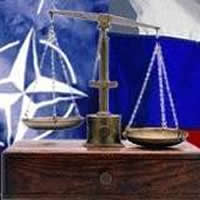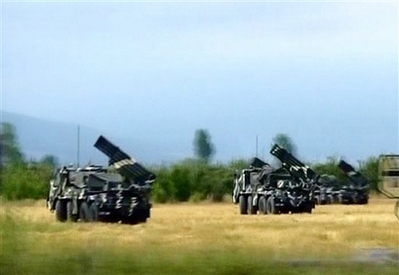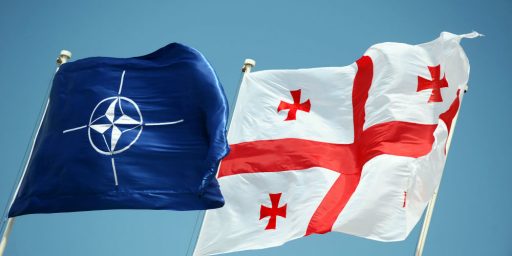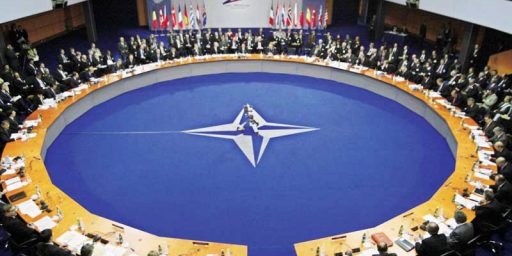NATO Toothless in Georgia Situation?
 Charles Krauthammer has a scathing column this morning excoriating NATO for its weak response to the Georgia crisis. He observes that NATO’s recent statement on the matter is “almost comically evenhanded.”
Charles Krauthammer has a scathing column this morning excoriating NATO for its weak response to the Georgia crisis. He observes that NATO’s recent statement on the matter is “almost comically evenhanded.”
It’s not until paragraph six that NATO, a 26-nation alliance with 900 million people and nearly half of world GDP, unsheathes its mighty sword, boldly declaring “Russian military action” — not aggression, not invasion, not even incursion, but “action” — to be “inconsistent with its peacekeeping role.”
Having launched a fearsome tautology Moscow’s way, what further action does the Greatest Alliance of All Time take? Cancels the next NATO-Russia Council meeting.
That’s it. No dissolution of the G-8 (group of industrial democracies). No blocking of Russian entry to the World Trade Organization. No suspension of participation in the 2014 Sochi Winter Olympics (15 miles from the Georgian border). No statement of support for the Saakashvili government.
Look, I would have preferred that NATO had been much bolder here. They announced at Bucharest that Georgia and Ukraine will eventually become members of the Alliance. That position has been reiterated in recent days by both Germany’s Angela Merkel and France’s Nicolas Sarkozy, who blocked Georgia’s admission to a Membership Action Plan at Bucharest. NATO membership, by definition, means that we would consider an attack on Georgian territory — which decidedly occurred here — to be an attack on all members. It’s a very bad signal, then, that we’ve done so little in immediate response to Russia’s attack on a country we’ve made that declaration about.
That said, NATO is a consensus organization comprised of 26 members with decidedly varying national interests. Krauthammer is quite right the New Europe has been much stronger here than Old Europe and about the reason for that: “Eastern Europe understands the stakes in Georgia. It is the ultimate target.” Contrariwise, Western Europe has little at stake in Georgia — let alone South Ossetia and Abkhazia — and much at stake with Russia.
Krauthammer is simply wrong when he says that the above measures would be “painless for the West.” Most of our European allies have much more to lose from further alienating Russia than we do because of their geographic proximity and greater economic ties. Most obviously, Russia is a huge energy supplier to the region.
The measures Krauthammer outlines should indeed be on the table. But lesser measures and a game of diplomatic kabuki is going to have to play out before we can achieve consensus on what are rather major steps.
Alliance politics are incredibly frustrating. That was true in the midst of World War II, when the need for consensus was even more urgent. Getting agreement from 26 parties on complex problems with significant risks and a decided lack of good options is next to impossible. Even American experts are far from agreement on what approach is best here, so it’s not surprising that Western and Eastern Europeans don’t see eye to eye. That means we muddle through and hope to get agreement as events play out.






IMO at this point the sole value of NATO to the United States over ad hoc agreements is that it reduces transaction costs for negotiations with European countries. That’s it.
Of the European countries only Britain and France have forces at what we’d think of as Level 1 readiness and their rules of engagement prevent them from being effective. There’s little support in any Western European country for increasing military expenditures to a level that would get them admitted to NATO if they weren’t already members.
I’m in no position to judge whether that makes our continued participation in NATO worthwhile or not. I think it makes all the sense in the world for the Europeans, however. That they don’t behave as though it makes sense is something I’ve been complaining about at my place for years.
Wasn’t this possibility, of Georgian action practically begging for a Russian response, one of the reasons why some NATO countries didn’t want to let them in right away? If that was the case, then this justifies their position, and no response to Russia’s attack is necessary.
James,
Not being familiar with the NATO charter, does it protect from any attack, or merely unprovoked ones? It’s like like Russia attacked Georgia out of the blue here. (Which is not to say that I think the Russian response was justified as it happened, but certainly I don’t think you can say that Georgia is a completely innocent victim here.)
I think just the fear of alienating Russia, more generally, was the issue. That’s a perfectly sound reason for rejecting Georgia’s membership. But they didn’t actually reject it but said it’d happen down the road.
The NATO Charter doesn’t seem to contemplate the idea of “provoked” attacks.
Moreover, while unwise, Saakashvili was well within his rights to respond to upscaled aggression from the breakaway provinces and Russia was in flagrant violation of international law for invading a sovereign UN Member State.
One could argue that same was true of the US missions in Kosovo and Iraq, of course, but at least there there were numerous Security Council Resolutions to hang our hat on/use as a fig leaf.
The only advantage of NATO, in my view was that it bypassed the UN in many areas. However, not all of them… being, as you say a “consensus organization” it suffers from the same malady as does the UN… that it is in fact a consensus organization… and that as such, the thing can’t get out of it’s own way even with such a clear-cut case as this:
And yes, I’m sure Ill be reminded that the US is in fact a consensus organization, as well. I fully agree, and point to the current congress as confirmation of the similarity of effectiveness.
Malady?
I thought you were the kind of guy who wanted “what the founders intended”. Well, this is what they intended.
Darn typos
Of course!
But the founders never figured on one factor entering into this… Read Washington’s farewell address, where he talks about the politics of faction.
They figured that factions would be a problem before Washington’s inaugural address. Many of them fought hard to prevent it both before and after Washington’s presidency.
In that same address, he also warned against against “entangling” foreign alliances (NATO) and getting involved in foreign wars (Georgia).
Then again, Washington was a mere mortal, and his views were a product of his times, not ours. We can’t rely on his judgments in 1796 to be the best solution to our current problems.
Because they saw, correctly, that government could onny be effective toward the goals of the culture absent those factional rifts.
The world has in fact changed… and isolationism as the founders wanted, is no longer ideal or even possible. HOwever, the point about factionalism crippling government remains valid today… and again, I point to the current Congress.
While I think it is fair to characterize the current congress as spineless and ineffective, to portray them as responsible for crippling government is kind of a joke.
Was the governments disgracefully pitiful response to Hurricane Katrina the fault of this Congress? The failure to get sufficient armor to the troops in Iraq in the early part of the war. This was back in the days when GOP dreams of “absolute power” and “permanent majority” filled the air.
“The NATO Charter doesn’t seem to contemplate the idea of “provoked” attacks.” Defending your own territory is not provoking an attack. The Russians took some time to prepare for their attacks.
The Georgians went into South Ossetia, part of Georgia, in attempt to quell artillery attacks on Georgia proper.
Well, you’re probably right about it not being possible. But I don’t know about ideal … there’s something to be said for letting every country and region work out its problems on its own (of course that’s where possible comes into play).
They ARE the government. If they’re broken, who takes over?
No, that was the faul;t of the corrupt and broken government in NOLA… who is run by what party again?
If it’s impossible, it’s no longer ideal.
They are a PART of the government. A rather small part numerically, and certainly in their day to day influence. The executive is a much larger and more interactive part of the government.
It’s funny how the party at fault in your judgment is always the Democratic party. I’m sure it’s just a highly improbable coincidence, and not bias on your part.
It was never possible. The best ideals are always impossible, but that only makes it more noble to try and reach them.